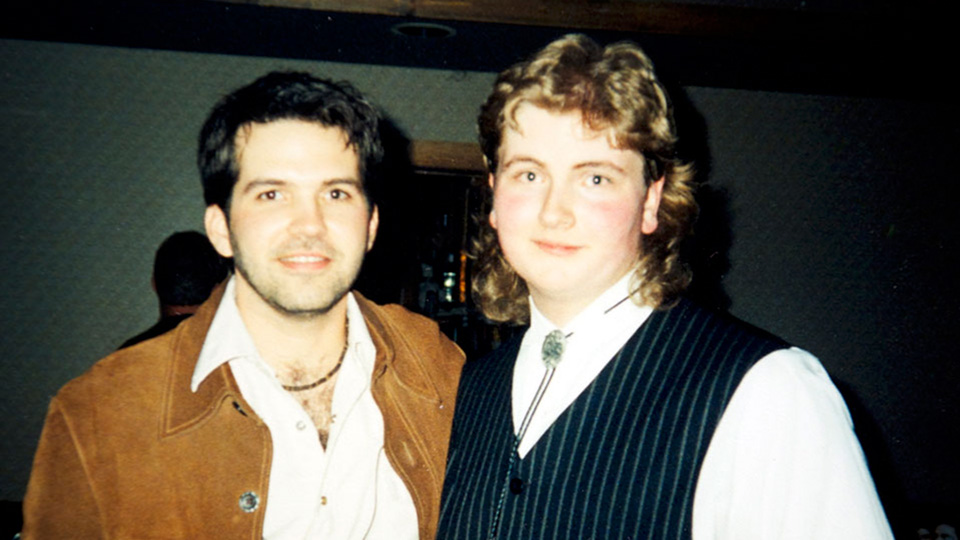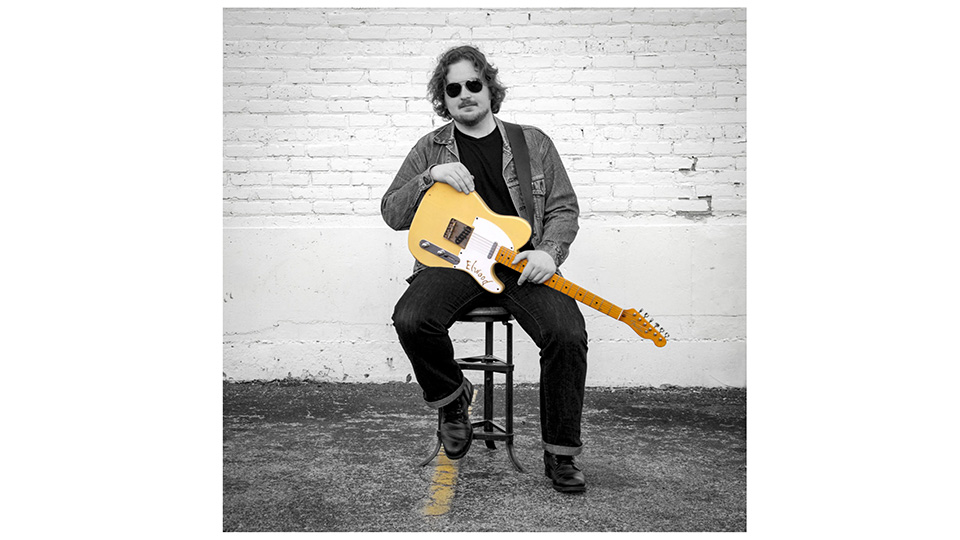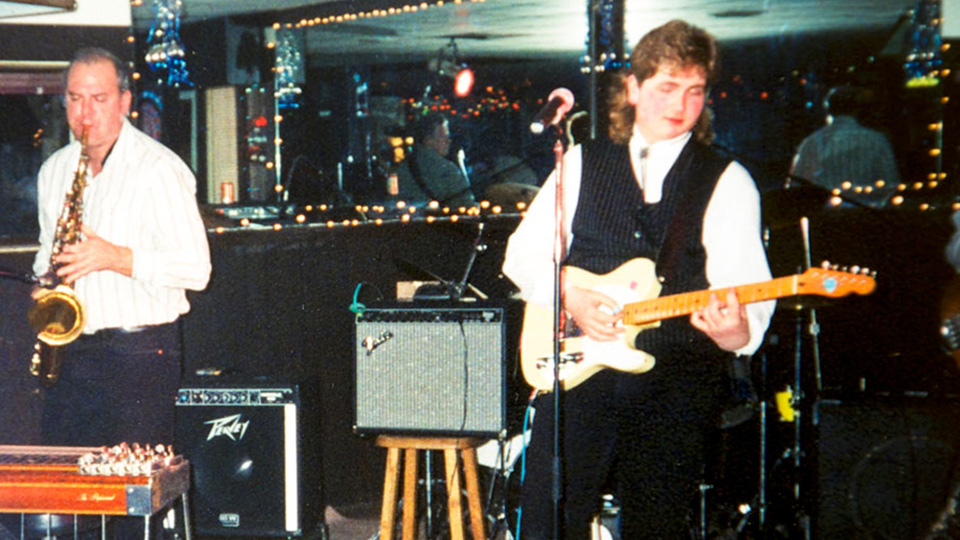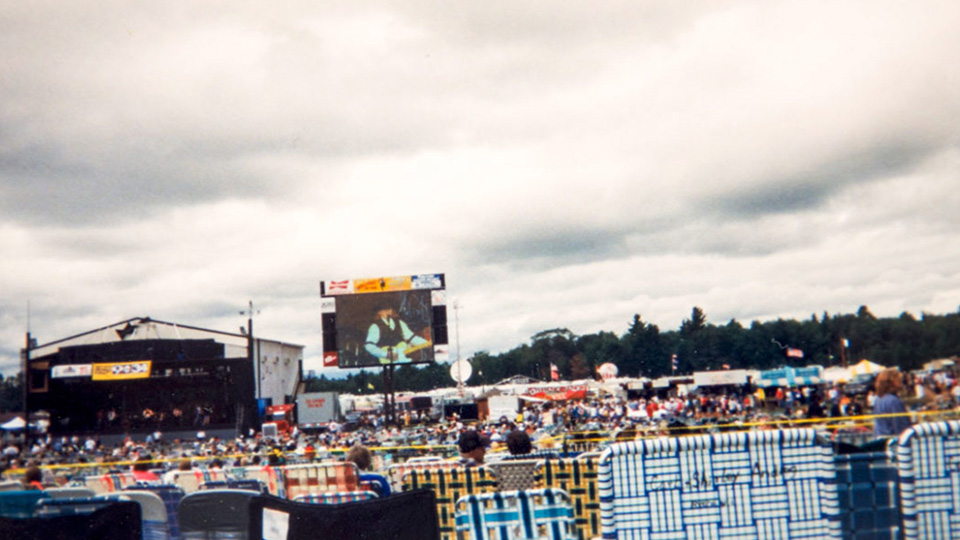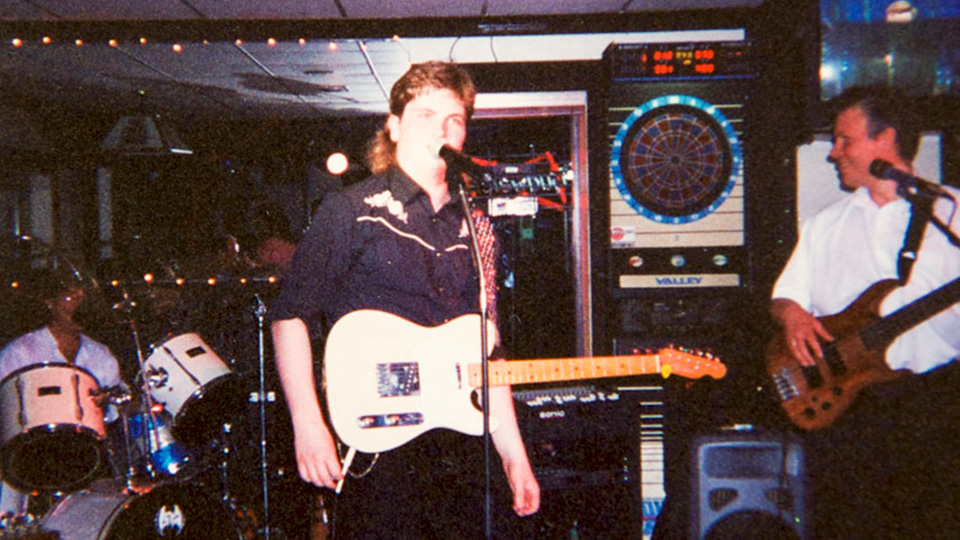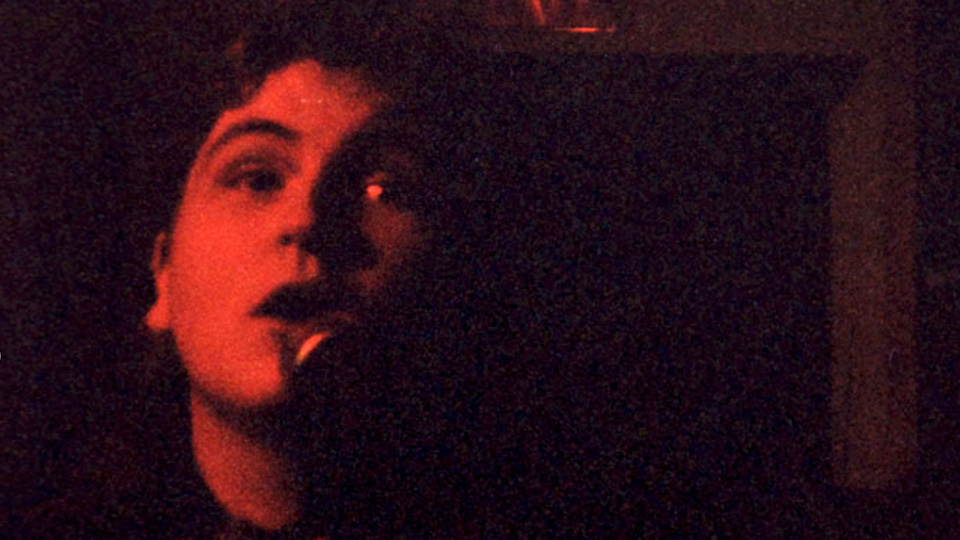Elwood Lee & his “One Man Electric Band” Under the Gun band – Love Me Two Times (Doors Cover) Under the Gun – Coming Back to Life
Publishers note: This feature was originally published in our November / December 2015 print edition.

By: Karla Jensen
In the movie, Back to the Future, Michael J. Fox’s main character Marty McFly appears on stage with his guitar and lets loose. The audience, circa 1955, is definitely not ready for a musician from the 80s who makes the guitar scream, the room pulse and his feet moonwalk…they are in awe. In getting to know Elwood Lee, he’s a lot like his 80s counterpart, Marty; a hometown musician with a youthful countenance and an unlikely maturity, personally and musically.
Elwood Lee was a child prodigy musician, making music for hire since his early teens. His grandfather, also an accomplished musician, influenced him tremendously, and they played together during his youth and young adulthood. Elwood still owns his grandfather’s Silvertone acoustic guitar – the same one that set his life on a course filled with music. Now, in 2015, barely into his thirties, Elwood is a throwback to a time gone by; an “old soul” who goes back in time effortlessly. His time machine is his talent, and the highway, his music. He consumes and releases energy of the ages in song and sound, a DeLorean parked right here in Beaver Dam.
Elwood’s career would make a cat’s nine lives look brief. “Sometimes I say that I’m an old man at 32,” he says, because of his experience, for which he is grateful. He has lived his music, explored his passions and continues to challenge himself musically as often as he can. His Twitter account outlines his many titles, defining him as a guitarist/singer, multi-instrumentalist, musician-for-hire, songwriter, record producer, spark plug, firecracker, and free thinker. “In the entertainment industry, I am a renaissance man… I do many things and do them well. I am proficient on many instruments,” he writes. Twitter’s a perfect place to voice his few words because he’s also an introvert and would rather hear music than chatter.
Despite being known locally, Celebrity is a four-letter word to this musician – Elwood would never consider himself as such. Conversely, he displays a “nice guy” exterior, and carries on pleasant and intelligent conversation. Far from the stereotypical self-absorbed music business narcissist, he comes across grounded and unpretentious. He has a wickedly funny and unexpected sense of humor. Hearing him wax poetic, even about simple matters like what he’s cooking for dinner, is like listening to a well-written, lyrical book on tape. He has an impressive command of the English language, and his speech has a compelling rhythm all his own.
Music fits Elwood like a glove. He has mastered nearly 20 instruments ranging from the mandolin to maracas. These include but are not limited to guitar, bass, drums, keyboards (including piano and organ), mandolin, steel guitar, dobro, harmonica, violin, autoharp, and banjo. He can also hear a song once and recall it in the photographic sense, relying less on reading music, more on hearing. He loves the challenge of a “face-off” on stage with skilled fellow musicians, he shares, because this kind of competition pushes all involved to a higher level of craftsmanship. “Iron sharpens iron,” he says with a grin.
Elwood Lee is proud of his music heritage and his bands, including the country Elwood Lee Band, which existed for 17 years, and more recently his Under the Gun Band, a classic rock group. He has made a lasting name for himself and his band by winning a top position, fourth place out of the recognized top six, at the HODAG Music Festival “Battle of the Bands” in 1999. (HODAG is a well-known country music festival in Rhinelander, Wisconsin that celebrated 38 years in 2015. The festival attracts top local bands from across the Midwest and major label artists such as Neal McCoy and Big & Rich.) This milestone launched him into a busy, full-time music career on the road at the age of 15. He would go on to compete in other years at HODAG as well. “These kinds of competitions are very high pressure,” Elwood shared. “It was nerve-wracking, but playing with other seasoned musicians, they said, ‘Let’s just do this!’ and we did. I felt encouraged, especially because many of our fan base came out to see us. Some other competing bands also had kind things to say.”
In 2003-2004, he learned to play the steel guitar. “I’d been putting feelers out for years, trying to find a teacher. I eventually acquired a steel guitar of my own and purchased four or five lessons from a friend and mentor, Eddie Rivers, to learn the correct technique. There’s more to it than you would think!” This helped move him up yet another rung on the marketable musician ladder, as if he needed one more reason. Rivers would leave Beaver Dam for Austin, Texas in 2004, after being hired by the Grammy-nominated western swing band, Asleep at the Wheel. “I’m privileged to know Eddie and was lucky to hang with and learn from him while he was here in town,” says Elwood.
Another musician who has influenced Elwood is Leo Kottke, a talented fingerpicking guitarist in the genres of blues, jazz, and folk music. Of Kottke, he says, “Leo blew my mind when I first heard him. He sounded like three guys playing at once!” Elwood makes no bones about his ability to learn from the greats in music, those in the past and those in the present. He studies them like the final is tomorrow.
Skilled as a songwriter, Elwood has penned at least 20 original songs. “Probably five of them are actually good,” he says. He’s a perfectionist, striving to be the best he can be. No disappointing the audience, his bandmates or himself. He makes music to make others feel happy and forget their cares.
In 2010, Elwood produced an album by Native American recording artist Bobby Bullet. He arrived on that session as a fiddle player, but owing to his expertise, ended up being named as record producer, a feat he is proud of and enjoyed tremendously. “Bobby knew what he wanted to achieve musically, but wasn’t sure how to put it into words, so I began spit-balling ideas with him until we found the sound that made him smile. The song Bigfoot had a straight ahead rock beat, but Bobby was seeking a totally different feel. ‘Like Bigfoot meets John Travolta’ as he put it. So we took it to the disco!” Elwood says with a laugh. The resulting album and title track Bigfoot would win Bobby Bullet two NAMA awards in 2010. Elwood would play multiple instruments on and co-produce Bullet’s 2011 album The Crooked Tear and 2012’s Justice in Time, using many unorthodox recording techniques and instruments to achieve unique sounds. Bullet would come to say of Elwood, “Together, we zeroed in on the true Bobby Bullet sound.”
In 2014, Elwood competed in the Beaver Dam Area Community Theatre’s (BDACT) Beaver Dam Singing Star and placed in the top three. He tweeted, “What a thrill!” and continued to congratulate others in the winner’s circle. “I wholeheartedly support BDACT and their new building.” He added, “It just needs to happen. It’s time.” Prior to that event, he also appeared in the summer BDACT musical Grease in 2003, playing electric guitar in the pit, and on stage in the role of Johnny Casino.
Most recently, in October, Elwood stood side by side with legendary musician and guitarist Paul Cotton of the group POCO appearing in Lindsay Gym at Wayland Academy. This is one of those magical moments that Elwood says has been a significant moment in his career. “I love playing with people more skilled than myself – ‘slinging the hash’ as Keith Richards of the Rolling Stones would call it. Paul Cotton is someone I have always looked up to, and it’s almost surreal to hear that voice and that guitar line and look up and see him there on stage, not 10 feet from me! And then he turns, points, and says, ‘Take it, Elwood!’ Knock me over with a feather.” In those performance opportunities, Elwood’s outwardly “Private: Do Not Enter,” reserved personality vanishes on stage where he becomes improvisational and spontaneous.
In a Peter Pan-like moment where few traces of adulthood remain, Elwood becomes an enthusiastic youth who reveals details about his collection of instruments and love for electric guitars and vintage amplifiers. He name drops brands of drum sets and a lineup of classy guitars, mentioning his favorite Epiphone and Yamaha FG-series acoustics, vintage “Airline” Archtop, Fender Telecaster and Gretsch Electromatic electric guitars like mistresses he has loved. “My love of amps is something of a sickness,” Elwood chuckles at himself. “I’m an avid tinkerer and I’m a sucker for gadgets. I own at least nine different guitar and bass amps, including new, vintage and rare models. I tend to like the big ones,” he says. He admits to shopping Craigslist to find his best deals and steals. His most recent find is a Roland “Cube” amplifier with built-in effects. “With the Cube, all I need is my guitar, a cable and that amp; I’m set to go. I call it ‘going barefoot’ because it’s so simple.”
During solo guitar shows, he employs a digital loop pedal, a tool that helps him to fill out his sound. The loop pedal was created by another of his heroes, Les Paul. (Paul hailed from Waukesha, Wisconsin and left his mark as a musician, artist, and inventor, pioneering the solid-body electric guitar and multi-track recording.) “As a collector, I make it my practice to always have a purpose for specific items and never own more than one or two of the same thing. I’m looking for items with a unique sound, and my guitar collection is a prime example. I try to play my guitars and other instruments equally, in rotation. They all need love and attention, the touch of hands. If they just sit in a closet, the sound becomes lifeless. Especially the acoustic instruments.”
Modest, succinct, and encouraged, this man has remained friends with nearly everyone he has played with and has expanded his sphere of influence. “I do believe that the life of a musician is highly glamorized. Like the Peace Corps, being a musician is the toughest job you’ll ever love. I’m satisfied making enough money to get by, not necessarily get rich. I’m always headed towards my next adventure and don’t mind the travel. I am comforted by the sound of the highway.” He continues to set goals he’d like to reach and strives daily to move toward those goals, to make a career out of his passion. Already seems he has and well.
What’s he listening to on his own iPod? In true Renaissance-man fashion, he doesn’t use iTunes or an iPod. He listens to country artist Sturgill Simpson, the American rock bands Assembly of Dust, Foo Fighters, and Augustana, Dwight Yoakam, and Ryan Adams. He often takes referrals from friends on good music and watches late night television to witness up and coming musicians. Elwood thanks his mother for allowing him to get into her vinyl record collection to expand his depth of music sounds and history. “Early on, I didn’t care for rock and roll. Then I started listening to albums from The Byrds, Eric Clapton, The Rolling Stones, The Beatles, Joe Walsh and the James Gang.” Vinyl won him over. “Nothing else sounds like vinyl… on a good vintage stereo; it’s like the band is there in the room with you.”
Elwood’s mother, Mary Flaherty, has served as his manager, van driver, road manager, and booking agent. From purchasing merchandise to booking hotels, she is accommodating to the band and her son’s needs and remains flexible. Elwood handles the finances and has since the start.
Despite so much talent, there is no convincing Elwood Lee that he is music royalty. He won’t hear of it. There is something completely charming about an artists’ humility when he captivates audiences but has no head in the clouds or room for fan girl behavior. A kind word is good enough to keep him moving forward, and that’s where he’s headed today. Into a bright future, maybe even back in time, with his heart and hands on so much music. Elwood shares his gratitude when a fan says, “Hey, Elwood, I really enjoyed your music the other night.” He graciously offers his thanks and moves on.

